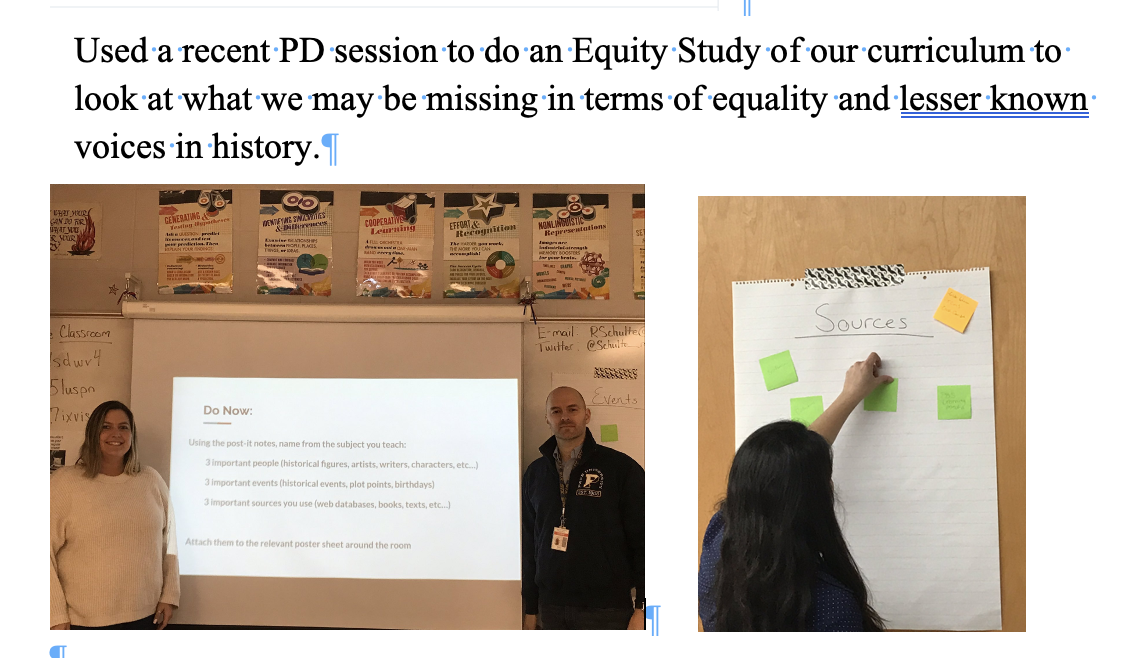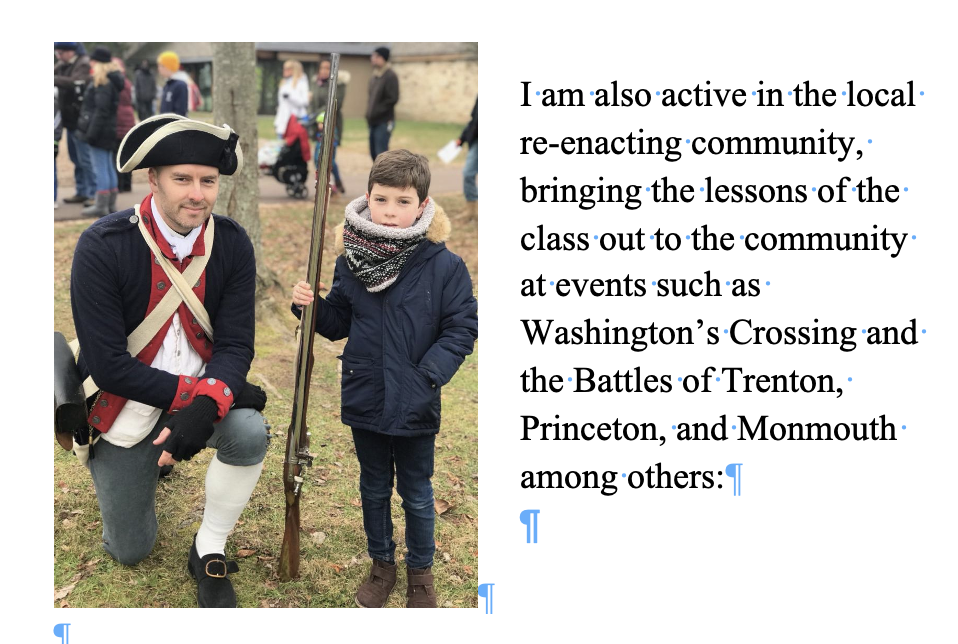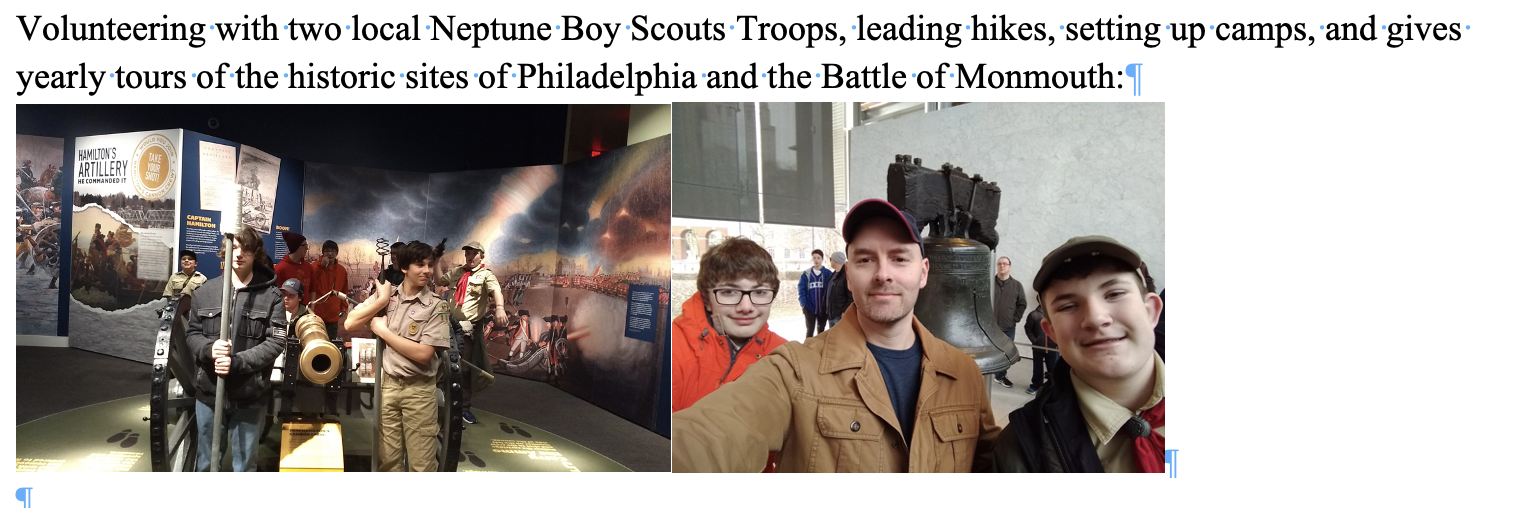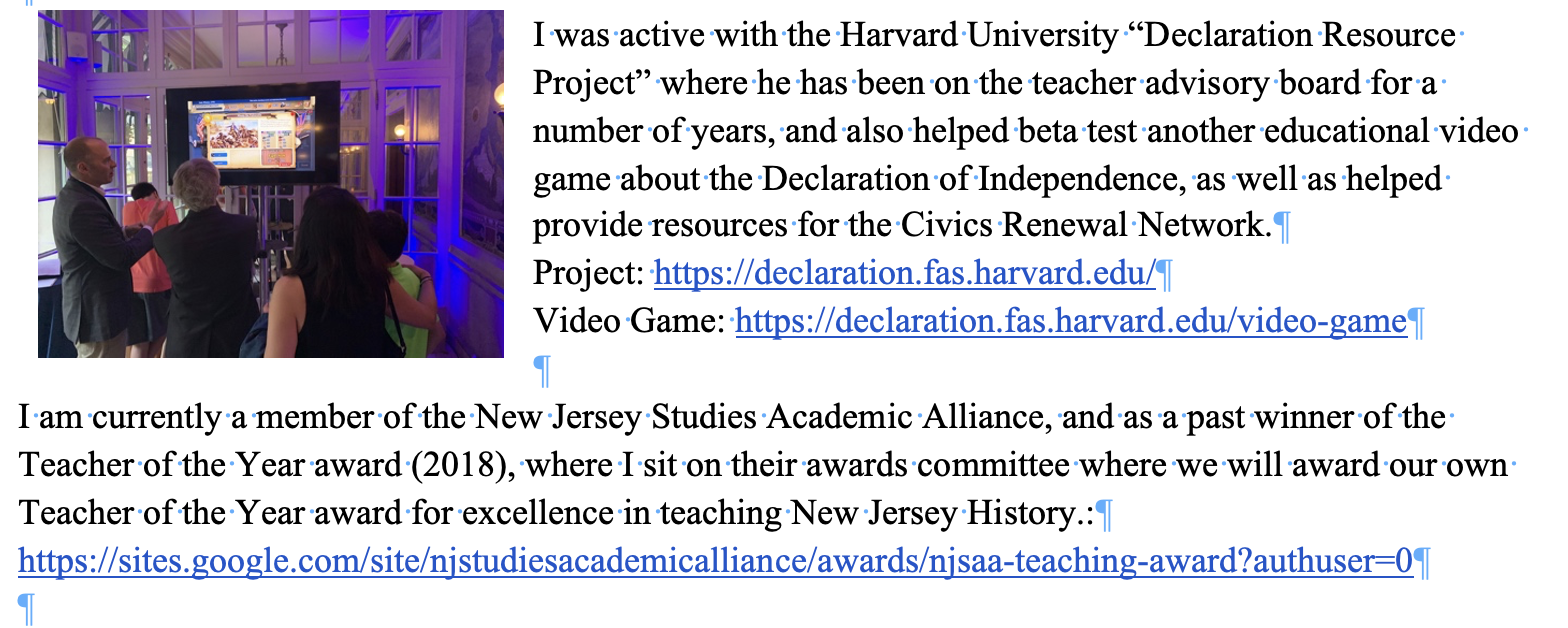2022 SAR Dr. Tom and Betty Lawrence History Teacher of the Year Award
Robert N. Schulte
8th Grade Social Studies Teacher, Reynolds Middle School,
Hamilton Township School District, Hamilton, NJ 08690
June 21, 2023
By unanimous decision, the New Jersey Society, Sons of the American Revolution, awarded the 2022 Reverend John Witherspoon American History Teacher of the Year Grant to Robert N. Schulte. Rob teaches 8th grade Social Studies at Reynolds Middle School, Hamilton Township School District, focusing on American History from Colonization through Reconstruction. His work inspires the cause of educating our youth about our founding history. He is a reenactor who participates annually in Washington's Crossing and local battles at Trenton and Princeton. He also works with the American Revolution Institute of the Society of the Cincinnati to present professional development on teaching the American Revolution to teachers nationwide, both online and in person. Last year, Mr. Schulte virtually presented at the National Council for Social Studies on the importance of teaching the American Revolution and is presenting again this year in person. He recently published a historical review focusing on the book Treacherous Beauty: Peggy Shippen, The Woman Behind Benedict Arnold's Plot To Betray America, where he discussed Shippen’s role in Arnold’s defection to the British side. Rob’s application was forwarded to the Education Director of the National Society, Sons of the American Revolution as New Jersey’s candidate for the SAR Dr. Tom and Betty Lawrence History Teacher of the Year Award. On June 21, 2023 Rob was named the winner in the Middle School category.
Why Study History
By Robert N. Schulte, Hamilton Township School District, Hamilton, NJ 08690
Copyright © 2022 by Rob Schulte, All Rights Reserved
When people ask “Why?” in the study of history, teachers often fall back on George Santayana in Vol. I, Reason in Common Sense, where he states, “Those who do not remember their past are condemned to repeat their mistakes.” While this answer is the default response for many teachers of history, my philosophy of education focuses on another of his quotes that “the great difficulty in education is to get experience out of ideas.” Students can see history as distant and out of reach, but how do we create experiences that drive their learning in meaningful and relevant ways? The American Revolution is particularly important. The Revolution created a nation based on certain principles that “all men are created equal,” that we have a guarantee of basic rights, and that our government is founded on principles of liberty and democracy based on our consent. All of our history lessons have to build on these basic principles fought for at our nation’s founding. Still, the founders could not create a complete and perfect government and society, they left it for us to continue their work to achieve these ideals of liberty and equality. We must educate our students in the Revolution's history and values so that they can continue to work towards and achieve its aspirational legacy.
Our history class thrives on creating experiences, but they need to be rooted in facts. When teaching history, it’s always important to work from a position of factual accuracy using primary sources. We spend much of our time in class trying to dispel the myths and legends that have taken root in the younger grades, such as the myths surrounding Betsy Ross and the flag or George Washington’s cherry tree. The real version of history, rooted in primary sources, is usually more interesting and more impactful than these myths. Cynics might say that history is a set of lies we agree upon, but the Hamilton musical does an amazing job of showing that we control not only who tells their story but how it is told. For the last 7 years, we have been using the Hamilton musical to build a meaningful experience in the classroom. With a diverse student population and many immigrants, the Hamilton musical has struck a chord with my students that traditional methods would not have achieved. The experience of listening to music far exceeds any lecture, and when combined with and compared to the primary sources that inspired the musical, it creates lasting understandings of both the history of what happened and the relevance of the urban and immigrant experience of those striving to “rise up.” Students who might not always show interest are writing lyrics in their notebooks, humming and singing along, and forcing their parents to listen in the car.
Another way we build revolutionary experiences in our classroom is by using first-person interpretation. Multiple times during the year, I come into class dressed as a historical figure or witness to a historical event, including a British Soldier at the Boston Massacre, a patriot soldier before Yorktown, George Washington, Thomas Jefferson, Meriwether Lewis, Abe Lincoln, among others. In some of these lessons, students are given a few minutes of introduction and have the chance for a lively discussion in which I will always remain in character. During these lessons of the Revolution, students also are given the opportunity to dress in colonial clothing, using either my reenacting gear or the travel trunks of the American Revolution Institute. In our lesson on Paul Reveres Ride, students listen to story time on the Longfellow poem but then work in groups to create a comparison chart to Revere's own primary source deposition. During a lesson on the Boston Massacre, students walk into a classroom set up as a complete crime scene, with evidence scattered around the room and witness testimony I give dressed as the British Captain Preston. Students complete detailed detective notebooks and write brief essays in the shoes of John Adams on whether the soldiers acted in self-defense or are guilty of murder! In yet other lessons, the figure will pose a problem to the class that they will need to solve; for example, George Washington visits and asks them for advice on how to fight at Yorktown. Using large parchment maps donated to our class by the Society of the Cincinnati, students practice geography skills and learn military history and present their plans to General Washington himself! In a lesson on federalism, I act as a modern government official and have them use technology on their Chromebooks to work collaboratively to solve a zombie apocalypse, using their work on levels of government and resources published by the CDC. These first-person lessons and practical applications give students real-life skills that will prepare them for the world outside of our classroom, with a need for strong interpersonal and critical thinking skills.
While doing special collections research at the Society of the Cincinnati, I was shown a set of letters they had recently acquired from a soldier by the name of Jonathan Birge. Working with their team, I was able to turn these letters into a lesson that they have published on their website, and I frequently present around the nation on their behalf as professional development. It takes his letters and traces his voyage and eventual death in the American Revolution. Students work in groups to break down his letters, analyze his motives, trace his influences in the Declaration of Independence and other documents, and reflect on the sacrifice he made for the new nation. The lesson shows just how much he sacrificed in his fight and helps explain why soldiers joined in this great cause, and a heartbreaking final note to his young son shows the human cost in the fight for Independence. In another lesson developed with their resources, I have students translate America To Britannia Rebuses and create their own colonial rebuses, making it relevant as they use Emojis as symbols to make short rebus-style tweets on the events of the revolution that I often share on my professional Twitter account.
One of the most exciting ways we have created experiences is by using virtual reality and 3D. I set up a Donors Choose to get 30 VR goggles donated to the school and purchased an additional 30 with my own funds. Stanford University's Virtual Human Interaction Lab states that "psychoactive technology" demonstrates that "your mind cannot tell the difference between virtual reality and real reality." In that way, we are building lessons students experience as a personal narrative to better understand context, emotion, and impact. Using my experience at my other job as a National Park Ranger, we can now use the "Power of Place" without field trips and trick the brain into learning it as they are really there! Most students already have phones in their pockets that can project virtual reality content, and these goggles allow us to engage students in ways that have never been experienced before. During a lecture on the Constitutional Convention, students used VR to stand in the assembly room of Independence Hall and look at the "rising sun chair." Students have used the immersive experience to inspire them to write narratively. We have also integrated the goggles into larger assignments, in a Crime Scene Investigation lesson on Lincoln's assassination, students used VR Goggles to stand in the box at Ford's theater and in the room where Lincoln died. I have even presented professional development sessions for other teachers and have shared the technology with many other teachers. In these ways and others, I hope to bring meaningful experiences to my students.
Outside of the classroom, I have taken great lengths to engage in professional development and to be part of the historical and educational communities. During the summer, I work as a uniformed Park Ranger at Independence National Historical Park in Philadelphia and teach our nation's founding to millions of diverse global visitors. I regularly reenact the Revolution teaching the public and community and reenactments of Washington’s Crossing and Battles such as Trenton, Princeton, and Monmouth. In addition to mentoring new history teachers, I also regularly invite student teachers and observers into my classroom to learn techniques for teaching the Revolution and beyond. I present PD on teaching the revolution in my own district and on behalf of the American Revolution Institute of the Society of the Cincinnati. Through the ARI, I have presented Zoom professional development seminars on teaching the Revolution to teachers around the nation, mostly focused on the lessons I have developed for publication on their website. I’ve presented with them at the National Council for Social Studies and will be working at their booth and presenting with them again this year. I’ve also been a member of the New Jersey Studies Academic Alliance, an organization that includes many NJ colleges and the Historical Society, where I serve on their awards committee. Our committee strives to recognize teachers who excel at teaching the history of the Garden State, and we publish their lessons after they receive our award. Many of their lessons focus on New Jerseys Revolutionary history and celebrate our role as the “Crossroads of the Revolution.” The curriculum I’ve written on Pop Culture in United States History was one of the first at the secondary level in the nation, and I have worked with teachers around the country to develop the course in their own districts. This involvement shows my desire to extend my teaching beyond just my students but into the State and National community, helping to train better teachers of our American Revolution.
I make great effort to continue to expand my teaching and content knowledge. I recently completed my Master's degree in American History through Pace University, paid for as New Jerseys James Madison Fellow in 2019. I have attended a number of residential summer programs, including the James Madison Seminar at Princeton University, the George Washington Teacher Institute at Mt. Vernon in VA, the American Revolution Institutes Master Teacher program where I was certified as a Master Teacher of the American Revolution, and the month-long James Madison Summer Institute as New Jerseys 2019 James Madison Fellow, we were spent an entire month studying the foundations of our nation for graduate credit through Georgetown University. I successfully completed the requirement of each program, earning a 4.0 at Georgetown, editing lessons published by Mt. Vernon, and publishing lessons still available on the website of the Society of the Cincinnati. For each seminar, I turn key the information learned back in my home districts through formal presentations and weekly professional learning community meetings. I was able to share specific documents and resources, model sample lessons that I developed or were provided from the seminars, and share content and educational strategies. I would be happy to attend any of the potentials suggested summer seminars and have already met the educational staff of many of these organizations through my work with the ARI and JMF Foundations. I use resources from each organization in my classes, have an interest in all of the topics, and would be able to turnkey through professional development and PLC meetings in the same way I have for the previous residential summer programs. I would be thrilled to work again with Arch Hunter at the Freedoms Foundation and love the site of Valley Forge and expanding its place in my classroom. I had the opportunity to visit Monticello with the JMF and have students write argumentative essays on Jefferson’s legacy which could continue to add depth to their study of his legacy, and my Boston Massacre Crime Scene is based on resources from Colonial Williamsburg. The SAR also shares much of the mission of the American Revolution Institute of the Society of the Cincinnati, where I already volunteer, so there is so much potential to gain from any of these seminars for both myself and to be brought back to my district and the other teachers I work with.
I believe that pictures and tangible items and lessons show the full depth of the work I am doing in the classroom, community, and beyond. I’ve included some links, screenshots, and other pictures to this essay to help you see firsthand the work that is taking place in bringing US History and the American Revolution to my students, fellow teachers, and the larger community. Please let me know if you have any questions at Rschulte@htsdnj.org or on my cell at (609)468-7907.













